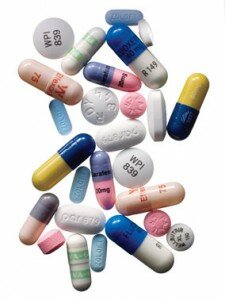Antidepressants
Antidepressants are few types of medication which is usually used for depression treatment. Antidepressants are used for restoring mentally depressed clients – antidepressants can improve the mental status of most depressed women. Antidepressant medication is used by mental health professional for controlling and managing depression symptoms. It is pretty strong medication which can be used only under professional guidance of your doctor.
It is important to mention that antidepressants were used for decades and all accumulated information show that treatment only with antidepressants cannot be fully effective – special changes in lifestyle are always needed.
Before you start using antidepressants, you need to know proper information including benefits, risk factors and side effects of antidepressants. Informed means armed – you can make your personal decision about antidepressants only if you are correctly informed.
Antidepressants mode of action
According to several studies, the main cause of depression is the deficit of neurotransmitters (chemical messengers) in the brain (such as serotonin, norepinephrine and dopamine). Scientists discovered deficit of norepinephrine at receptors in the brain in clients with depression. Antidepressants are designed to increase the concentration of neurotransmitters at receptors level in the brain. Different types of antidepressants “work” differently. Some antidepressants (amphetamines, electroconvulsives) increase the release of neurotransmitters (norepinephrine), others (monoamine oxidase inhibitors – MAO inhibitors) just prevent inactivation of neurotransmitters and the third type of antidepressants prevent the re uptake of neurotransmitters.
Once the level of needed neurotransmitters is fixed, the depression can be treated.
Antidepressants types
Antidepressants tricyclic
This type of antidepressants is one of effective methods for depression treatment.
Scientists discovered that in many cases the depression is caused by imbalance of certain neurotransmitters (chemical messengers) in the brain, such as serotonin, norepinephrine and dopamine. Tricyclic antidepressants increase the level of norepinephrine (noradrenaline – hormone and neurotransmitter)
Examples of tricyclic antidepressants – Imipramine (Tofranil), Amitriptylin, Desipramine (Norpramin).
Antidepressants – selective Serotonin re uptake inhibitors
This type of antidepressants are considered as a modern medication for depression treatment – this antidepressants block selectively the re uptake of serotonin. Thanks to this type of antidepressants the level of serotonin is increasing in the central nervous system.
Examples of antidepressants with selective Serotonin re uptake – Clomiprimine, Fluoxetine (Prozac), Sertraline, Paroxetine.
Antidepressants – MAO Inhibitors (Monoamine Oxidase inhibitors)
This type of antidepressants triggers the oxidative deamination of norephinephrine, serotonin, and other amines – this oxidation cause reduced levels of neurotransmitter and increased levels of norepinephrine which in turn causes a stimulation effect.
This type of antidepressants is not very effective and, at the same time, they have several side effects.
Examples of antidepressants/MAO inhibitors – Phenelzine (Nardil), Isocarboxazid (Marplan).
Antidepressants benefits
Main benefit of antidepressants is the dramatic reduction and/or disappearance of depression symptoms during treatment. It was noted that antidepressants are effective in severe cases of depression. In other cases several other methods could be also effective.
As causes of depression are not very clear, it is not very clear how and why sometimes antidepressants are effective and sometimes not really.
Only antidepressants cannot be a solution for depression. Other additional methods should be combined with antidepressants. It is very important to fight the main cause of depression – stressful life, unhealthy relationship, social pressure, abuse (psychological or physical), unhealthy lifestyle, etc.
Antidepressants side effects
In most cases antidepressants’ side effects are short-term but there is a list of side effects mentioned by clients who used antidepressants for depression treatment.
Most common side effects of antidepressants include the following:
- Headache
- Nausea
- Insomnia
- Anxiety
- Restlessness
- Decreased libido
- Dizziness
- Weight gain
- Feeling jittery (agitation)
- Dry mouth
- Diarrhea
- Constipation
- Changed vision
- Daytime drowsiness
- Tremors
- Sweating
- Suicide attempts
Some antidepressants’ side effects disappear after the first few weeks but sometimes side effects could get worse for long period.
Antidepressants risk factors
Some antidepressants’ side effects could be considered as a risk factor. It was noted that some groups of people are on higher risk while using antidepressants:
- Women after 65,
- Pregnant women,
- Youth girls (teens, adolescents),
- Women with bipolar disorder.
Antidepressants and suicide attempts
Medical professionals noted increased risk of suicide attempts in clients who use antidepressants. Highest risk of suicide thoughts and/or suicide attempts was noted in children and youth. The suicide risk is particularly great during the first one to two months of antidepressant treatment.
























